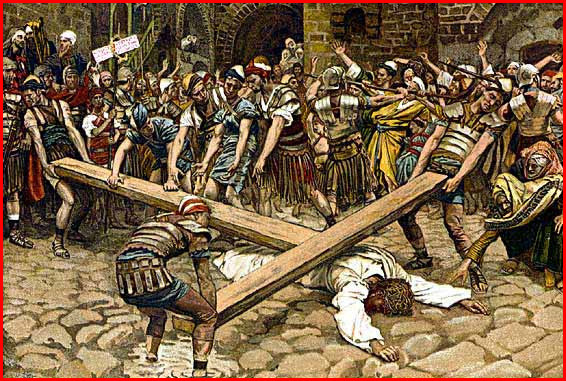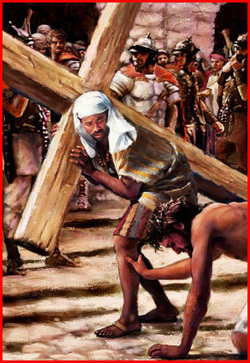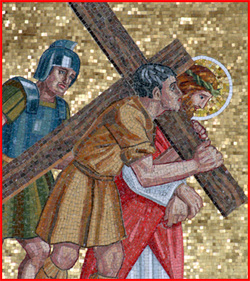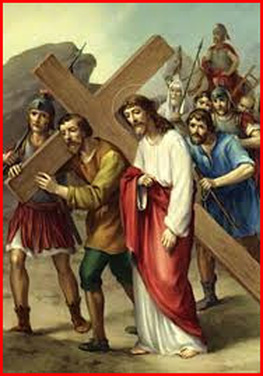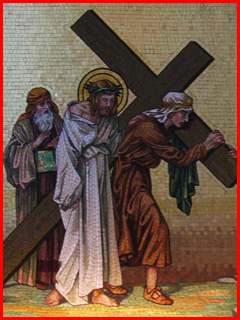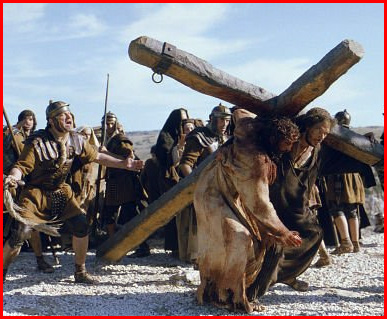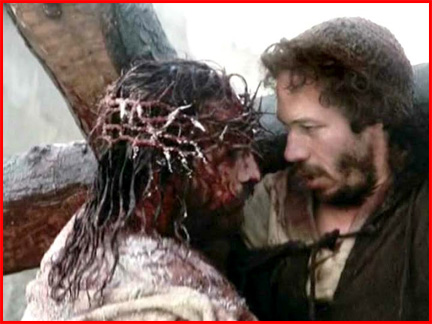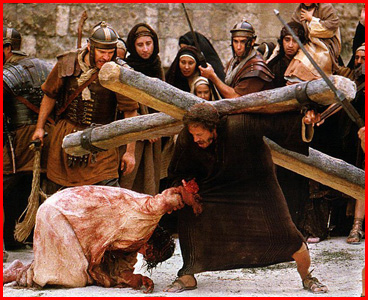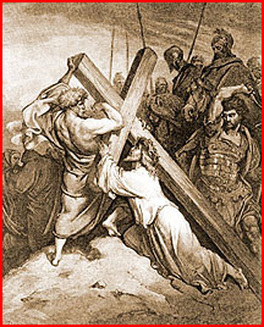| Devotion to Our Lady |
|
- Homepage
-
Daily Thoughts
- 2023 October Daily Thoughts
- Daily Thoughts Lent 2020
- Daily Thoughts for Advent 2019
- Daily Thoughts for October 2019
- Daily Thoughts for September 2019
- Daily Thoughts for August 2019
- Daily Thoughts for July
- Daily Thoughts for June
- Daily Thoughts for Easter 2019
- Daily Thoughts for Lent 2019
- Daily Thoughts for Christmas
- Daily Thoughts Easter 2022
- Sacred Heart
- Holy Ghost
-
Spiritual Life
- Holy Mass Explained
- First Friday Devotions
- First Saturday Devotions
- The Mercy of God
- Vocations
- The Path Everyone Must Walk >
- Gift of Failure
- Halloween or Hell-O-Ween?
- Ignatian Spiritual Exercises >
- Meditation is Soul-Saving
- Spiritual Communion
- Miraculous Medal
- Enrollment in Miraculous Medal
- St. Benedict Medal
- Holy Water
- Advice on Prayer
- Your Daily Mary
-
Prayers
- September Devotions
- Seven Sorrows of Our Lady
-
Novenas
>
- NV-Help of Christians
- NV-Nativity of Our Lady
- NV-Seven Sorrows
- NV- Sorrowful Heart
- NV-Pope St Pius X
- NV-La Salette
- NV-St Michael Archangel
- NV-Immaculate Heart
- NV-Assumption
- NV-Novena for Fathers
- NV-Novena for Your Mother
- NV-St Raphael Archangel
- NV-Souls in Purgatory
- NV-All Saints Day
- NV-Christ the King
- NV-Divine Motherhood
- NV-Guardian Angels
- NV-Rosary
- NV-Mirac Med
- NV- Imm Conc
- NV - Guadalupe
- NV - Nativity of Jesus
- NV-Epiphany
- NV-OL Good Success
- NV-Lourdes
- NV-St Patrick
- NV-St Joseph
- NV-Annunciation
- NV-St Louis de Montfort
- NV-OL Good Counsel
- NV-Last Supper
- NV-Passion
- NV-Pentecost
- NV-Ascension
- NV-Sacred Heart
- NV-Sacred Heart & Perpetual Help
- NV-Corpus Christi
- NV-OL of Perpetual Help
- NV-Queenship BVM
- NV-OL of Mount Carmel
- NV-St Mary Magdalen
- NV- Im Hrt
- August Devotions to IHM
- Immaculate Heart of Mary
- Litany of Dependence
- Prayers to St Mary Magdalen
- Prayers in Times of Sickness Disease & Danger
- Holy Souls in Purgatory
- Meditations on the Litany of Our Lady
- Special Feast Days
- Prayers to Mary (Mon-Sun)
- Litanies to Our Lady >
- Various & Special Needs
- Our Lady of the Rosary
- Our Lady of Mt. Carmel
- Our Lady of Perpetual Help
- Our Lady of Guadalupe
- Other titles of Our Lady
-
Rosary
- Downloads
- Consecration
- Easter Season
-
Holy Week
- Last Seven Words of Jesus >
- Characters of Passion >
- The Last Days of Christ
- Before Palm Sunday
- Palm Sunday
- Monday in Holy Week
- Tuesday in Holy Week
- Wednesday in Holy Week
- Holy Thursday (Last Supper)
- Holy Thursday (Agony & Arrest)
- Night Vigil with Christ
- Good Friday (Pilate & Herod)
- Good Friday (Way of Cross & Crucifixion)
- Saturday in Holy Week
-
Lent
- Ideas for Lent
- Daily Lenten Planner
- Daily Lenten Liturgy
- From Cold to Hot
- Lent with Aquinas
- Lent with Dom Gueranger
- Virtues for Lent
- History of Penance
- How Expensive is Sin?
- Confession of Sins
- Letter to Friends of the Cross
- Sermons for Lent
- Stations of the Cross >
- Lenten Prayers
- 7 Penitential Psalms
- Lenten Psalms SUN
- Lenten Psalms MON
- Lenten Psalms TUE
- Lenten Psalms WED
- Lenten Psalms THU
- Lenten Psalms FRI
- Lenten Psalms SAT
- Lenten Laughs
- Septuagesima
-
Christmas
- Epiphany Explained
- Suggestions for Christmas
- Food For Thought
- Christmas with Aquinas
- Christmas with Dom Gueranger
- Christmas Prayers
- Candles & Candlemas
- Christmas Sermons
- Christmas Prayers SUN
- Christmas Prayers MON
- Christmas Prayers TUE
- Christmas Prayers WED
- Christmas Prayers THU
- Christmas Prayers FRI
- Christmas Prayers SAT
- Twelve Days of Christmas >
-
Advent Journey
- Purgatory
- Christ the King
- Legion of Mary
- Scapular
-
Saints
-
Martyrs for the Faith
>
- Your Daily Martyr >
- All 365 Days of Martyrs
- Cristeros
- St Valentine & Valentine's Day
- Martyrs--Thomas Becket
- Martyrs--John the Apostle
- Holy Machabees
- Age of Martyrdom
- Carmelites of Compiegne
- Martyrs--Peter & Paul
- Martyrs--John the Baptist
- Martyrs--Andrew
- Martyrs--James the Great
- Martyrs--North American
- Martyrs--Seven Holy Sleepers
- Martyrs--Afra
- School of Martyrdom
- Martyrs--Christina
- Desert Saints >
- Saints for Sinners >
- Saints of Mary >
- History of All Saints Day
-
Martyrs for the Faith
>
- Precious Blood
- Synod 2023
-
Catechism
- Catechism Lesson 1
- Catechism Lesson 2
- Catechism Lesson 3
- Catechism Lesson 4
- Catechism Lesson 5
- Catechism Lesson 6
- Catechism Lesson 7
- Catechism Lesson 8
- Catechism Lesson 9
- Catechism Lesson 10
- Catechism Lesson 11
- Catechism Lesson 12
- Catechism Lesson 13
- Catechism Lesson 14
- Catechism Lesson 15
- Catechism Lesson 16
- Catechism Lesson 17
- Catechism Lesson 18
- Catechism Lesson 19
- Catechism Lesson 20
- Catechism Lesson 21
- Catechism Lesson 22
- Bible Study
-
Calendar
- Miracles
- Apparitions
- Shrines
- Prophecies
- Angels Homepage
- Hell
-
Church Crisis
- Conspiracy Theories
- Amazon Synod 2019 >
- Liberalism & Modernism
- Modernism--Encyclical Pascendi
- Modernism & Children
- Modernism--Documents
- The Francis Pages
- Church Enemies on Francis
- Francis Quotes
- Amoris Laetitia Critique
- Danger of Ignorance (Pius X)
- Restore all In Christ (Pius X)
- Catholic Action (Pius X)
- Another TITANIC Disaster?
- The "Errors of Russia"
- CRISIS PRAYERS
- Election Novena 2024
- The Anger Room
- War Zone
- Life of Mary
- Spiritual Gym
- Stupidity
- Coronavirus and Catholicism
- History & Facts
- Books
- Catholic Family
- Children
- Daily Quiz
-
Novena Church & Pope
- Day 01 Church-Pope Novena
- Day 02 Church-Pope Novena
- Day 03 Church-Pope Novena
- Day 04 Church-Pope Novena
- Day 05 Church-Pope Novena
- Day 06 Church-Pope Novena
- Day 07 Church-Pope Novena
- Day 08 Church-Pope Novena
- Day 09 Church-Pope Novena
- Day 10 Church-Pope Novena
- Day 11 Church-Pope Novena
- Day 12 Church-Pope Novena
- Day 13 Church-Pope Novena
- Day 14 Church-Pope Novena
- Day 15 Church-Pope Novena
- Day 16 Church-Pope Novena
- Day 17 Church-Pope Novena
- Day 18 Church-Pope Novena
- Day 19 Church-Pope Novena
- Day 20 Church-Pope Novena
- Day 21 Church-Pope Novena
- Day 22 Church-Pope Novena
- Day 23 Church-Pope Novena
- Day 24 Church-Pope Novena
- Day 25 Church-Pope Novena
- Day 26 Church-Pope Novena
- Day 27 Church-Pope Novena
- Day 28 Church-Pope Novena
- Day 29 Church-Pope Novena
- Day 30 Church-Pope Novena
- Day 31 Church-Pope Novena
- Day 32 Church-Pope Novena
- Day 33 Church-Pope Novena
- Day 34 Church-Pope Novena
- Day 35 Church-Pope Novena
- Day 36 Church-Pope Novena
- Day 37 Church-Pope Novena
- Day 38 Church-Pope Novena
- Day 39 Church-Pope Novena
- Day 40 Church-Pope Novena
- Day 41 Church-Pope Novena
- Day 42 Church-Pope Novena
- Day 43 Church-Pope Novena
- Day 44 Church-Pope Novena
- Day 45 Church-Pope Novena
- Day 46 Church-Pope Novena
- Day 47 Church-Pope Novena
- Day 48 Church-Pope Novena
- Day 49 Church-Pope Novena
- Day 50 Church-Pope Novena
- Day 51 Church-Pope Novena
- Day 52 Church-Pope Novena
- Day 53 Church-Pope Novena
- Day 54 Church-Pope Novena
- Penance Novena
- Daily WeAtheR Forecast
| 1st Station | 2nd Station | 3rd Station | 4th Station | 5th Station | 6th Station | 7th Station |
| 8th Station | 9th Station | 10th Station | 11th Station | 12th Station | 13th Station | 14th Station |
| 8th Station | 9th Station | 10th Station | 11th Station | 12th Station | 13th Station | 14th Station |
The Greatest and Most Important Time in the Church's Liturgical Year
CLICK ON ANY LINK BELOW
Also lots of LENTEN & HOLY WEEK DOWNLOADS on the downloads page (click here)
LENTEN PAGES
| ASH WEDNESDAY COUNTDOWN | LENT (MAIN PAGE) | DAILY THOUGHTS | DAILY LENTEN LITURGY | DAILY LENTEN PLANNER |
| LENTEN PRAYERS | THE 7 PENITENTIAL PSALMS | IDEAS FOR PENANCE | LENT WITH AQUINAS | LENT WITH DOM GUERANGER |
| HISTORY OF PENANCE | PENANCES OF THE SAINTS | HOW EXPENSIVE IS SIN? | CONFESSION OF SINS | ARE FEW SOULS SAVED? |
| VIRTUES FOR LENT | FROM COLD TO HOT | LENTEN LAUGHS | | SERMONS FOR LENT | LETTER TO FRIENDS OF THE CROSS |
| STATIONS OF THE CROSS (INDIVIDUALLY) | ALL 14 STATIONS OF THE CROSS | LITANIES FOR PASSIONTIDE |
| THE LAST DAYS OF CHRIST | SPECIAL HOLY WEEK PAGES |
LITURGICAL PRAYERS FOR EACH DAY OF THE WEEK DURING LENT
| Sundays of Lent | Mondays of Lent | Tuesdays of Lent | Wednesdays of Lent | Thursdays of Lent | Fridays of Lent | Saturdays of Lent |
HOLY WEEK PAGES
| Holy Week Main Page | Before Palm Sunday | Palm Sunday | The Last Days of Christ | Holy Thursday Last Supper Novena | Good Friday Passion Novena |
| Monday of Holy Week | Tuesday of Holy Week | Wednesday of Holy Week | Holy Thursday (Last Supper) | Holy Thursday (Agony & Arrest) |
| Night Vigil With Christ | Good Friday (Pilate & Herod) | Good Friday (Way of Cross & Crucifixion) | Holy Saturday |
THE CHIEF CHARACTERS OF THE PASSION
| Characters of the Passion Mainpage | The Sanhedrin | Pharisees | Scribes | Saducees | Jewish Crowd | Roman Rulers |
| Judas | Annas & Caiphas | Pontius Pilate | Herod | Barabbas | Dismas the Good Thief | St. Peter | St. John | Mary Magdalen |
THE FOURTEEN STATIONS OF THE CROSS
| Introduction to the Stations of the Cross | Short Version of the Stations of the Cross (all 14 on one page) | 1st Station | 2nd Station | 3rd Station |
| 4th Station | 5th Station | 6th Station | 7th Station | 8th Station | 9th Station | 10th Station | 11th Station | 12th Station | 13th Station | 14th Station |
THE LAST SEVEN WORDS OF JESUS FROM THE CROSS
| Seven Last Words on the Cross (Introduction) | The 1st Word on the Cross | The 2nd Word on the Cross | The 3rd Word on the Cross |
| The 4th Word on the Cross | The 5th Word on the Cross | The 6th Word on the Cross | The 7th Word on the Cross |
PRAYERS AND DEVOTIONS TO THE SEVEN SORROWS OF OUR LADY
| Seven Sorrows Meditations | Short Prayers & Short Seven Sorrows Rosary | Longer Seven Sorrows Rosary |
| 1st Sorrow of Our Lady | 2nd Sorrow of Our Lady | 3rd Sorrow of Our Lady | 4th Sorrow of Our Lady |
| 5th Sorrow of Our Lady | 6th Sorrow of Our Lady | 7th Sorrow of Our Lady |
| Novena #1 to the Sorrowful Heart of Mary | Novena #2 to the Sorrowful Heart of Mary |
CLICK ON ANY LINK BELOW
Also lots of LENTEN & HOLY WEEK DOWNLOADS on the downloads page (click here)
LENTEN PAGES
| ASH WEDNESDAY COUNTDOWN | LENT (MAIN PAGE) | DAILY THOUGHTS | DAILY LENTEN LITURGY | DAILY LENTEN PLANNER |
| LENTEN PRAYERS | THE 7 PENITENTIAL PSALMS | IDEAS FOR PENANCE | LENT WITH AQUINAS | LENT WITH DOM GUERANGER |
| HISTORY OF PENANCE | PENANCES OF THE SAINTS | HOW EXPENSIVE IS SIN? | CONFESSION OF SINS | ARE FEW SOULS SAVED? |
| VIRTUES FOR LENT | FROM COLD TO HOT | LENTEN LAUGHS | | SERMONS FOR LENT | LETTER TO FRIENDS OF THE CROSS |
| STATIONS OF THE CROSS (INDIVIDUALLY) | ALL 14 STATIONS OF THE CROSS | LITANIES FOR PASSIONTIDE |
| THE LAST DAYS OF CHRIST | SPECIAL HOLY WEEK PAGES |
LITURGICAL PRAYERS FOR EACH DAY OF THE WEEK DURING LENT
| Sundays of Lent | Mondays of Lent | Tuesdays of Lent | Wednesdays of Lent | Thursdays of Lent | Fridays of Lent | Saturdays of Lent |
HOLY WEEK PAGES
| Holy Week Main Page | Before Palm Sunday | Palm Sunday | The Last Days of Christ | Holy Thursday Last Supper Novena | Good Friday Passion Novena |
| Monday of Holy Week | Tuesday of Holy Week | Wednesday of Holy Week | Holy Thursday (Last Supper) | Holy Thursday (Agony & Arrest) |
| Night Vigil With Christ | Good Friday (Pilate & Herod) | Good Friday (Way of Cross & Crucifixion) | Holy Saturday |
THE CHIEF CHARACTERS OF THE PASSION
| Characters of the Passion Mainpage | The Sanhedrin | Pharisees | Scribes | Saducees | Jewish Crowd | Roman Rulers |
| Judas | Annas & Caiphas | Pontius Pilate | Herod | Barabbas | Dismas the Good Thief | St. Peter | St. John | Mary Magdalen |
THE FOURTEEN STATIONS OF THE CROSS
| Introduction to the Stations of the Cross | Short Version of the Stations of the Cross (all 14 on one page) | 1st Station | 2nd Station | 3rd Station |
| 4th Station | 5th Station | 6th Station | 7th Station | 8th Station | 9th Station | 10th Station | 11th Station | 12th Station | 13th Station | 14th Station |
THE LAST SEVEN WORDS OF JESUS FROM THE CROSS
| Seven Last Words on the Cross (Introduction) | The 1st Word on the Cross | The 2nd Word on the Cross | The 3rd Word on the Cross |
| The 4th Word on the Cross | The 5th Word on the Cross | The 6th Word on the Cross | The 7th Word on the Cross |
PRAYERS AND DEVOTIONS TO THE SEVEN SORROWS OF OUR LADY
| Seven Sorrows Meditations | Short Prayers & Short Seven Sorrows Rosary | Longer Seven Sorrows Rosary |
| 1st Sorrow of Our Lady | 2nd Sorrow of Our Lady | 3rd Sorrow of Our Lady | 4th Sorrow of Our Lady |
| 5th Sorrow of Our Lady | 6th Sorrow of Our Lady | 7th Sorrow of Our Lady |
| Novena #1 to the Sorrowful Heart of Mary | Novena #2 to the Sorrowful Heart of Mary |
THE FIFTH STATION : SIMON OF CYRENE HELPS JESUS CARRY HIS CROSS
“St. Augustine assures us that there is no spiritual exercise more fruitful or more useful than the frequent reflection on the sufferings of Our Lord. St. Albert the Great, who had St. Thomas Aquinas as his student, learned in a revelation that by simply thinking of or meditating on the Passion of Jesus Christ, a Christian gains more merit than if he had fasted on bread and water every Friday for a year, or had beaten himself with the discipline once a week till blood flowed, or had recited the whole Book of Psalms every day” (The Secret of the Rosary, St. Louis Marie de Montfort, “Twenty-Eighth Rose”).
|
The following passage is taken from The Mystical City of God by the Venerable Mary of Agreda
Our Savior proceeded on the way to Calvary bearing upon His shoulders, according to the saying of Isaias, His own government and principality (Isaias 9:6), which was none else than His Cross, from whence He was to subject and govern the world, meriting thereby that His Name should be exalted above all other names and rescuing the human race from the tyrannical power of the demon. In order to destroy this tyrant and break the sceptre of his reign and the yoke of our servitude, Christ our Savior placed the Cross upon His shoulders; namely, upon that place, where are borne both the yoke of slavery and the sceptre of royal power. He wished to intimate thereby, that He despoiled the demon of this power and transferred it to His own shoulders, in order that thenceforward the captive children of Adam should recognize Him for their legitimate Lord and true King. All mortals were to follow Him in the way of the Cross (Matthew 14:24) and learn, that by this Cross they were subjected to His power (John 12:32) and now become His vassals and servants, bought by His own lifeblood (1 Corinthians 4:20). The executioners, bare of all human compassion and kindness, dragged our Savior Jesus along with incredible cruelty and insults. Some of them jerked Him forward by the ropes in order to accelerate His passage, while others pulled from behind in order to retard it. On account of this jerking and the weight of the Cross they caused Him to sway to and fro and often to fall to the ground. By the hard knocks He thus received on the rough stones great wounds were opened, especially on the two knees and they were widened at each repeated fall. The heavy Cross also inflicted a wound on the shoulder on which it was carried. The unsteadiness caused the Cross sometimes to knock against His sacred head, and sometimes the head against the Cross; thus the thorns of his crown penetrated deeper and wounded the parts, which they had not yet reached. To these torments of the body the ministers of evil added many insulting words and affronts, ejecting their impure spittle and throwing the dirt of the pavement into His face so mercilessly, that they blinded the eyes that looked upon them with such divine mercy. Thus they of their own account condemned themselves to the loss of the graces, with which His very looks were fraught. By the haste with which they dragged Him along in their eagerness to see Him die, they did not allow Him to catch his breath; for His most innocent body, having been in so few hours overwhelmed with such a storm of torments, was so weakened and bruised, that to all appearances He was ready to yield up life under his pains and sorrows. In fulfillment of the prayerful wish of the blessed Mother the Pharisees and ministers were inspired with the resolve to engage some man to help Jesus our Savior in carrying the Cross to Mount Calvary. At this juncture, Simon, of Cyrene, the father of the disciples Alexander and Rufus (Mark 15:21), happened to come along. He was called by this name because he was a native of Cyrene, a city of Libya, and had come to Jerusalem. This Simon was now forced by the Jews to carry the Cross a part of the way. They themselves would not touch it, yea would not even come near it, as being the instrument of punishment for One whom they held to be a notorious malefactor. By this pretended caution and avoidance of His Cross they sought to impress the people with a horror for Jesus. The Cyrenean took hold of the Cross and Jesus was made to follow between the two thieves, in order that all might believe Him to be a criminal and malefactor like to them. The following passage is taken from The Dolorous Passion of Our Lord Jesus Christ by Anne Catherine Emmerich The procession had reached an arch formed in an old wall belonging to the town, opposite to a square, in which three streets terminated, when Jesus stumbled against a large stone which was placed in the middle of the archway; the cross slipped from His shoulder, He fell upon the stone, and was totally unable to rise. Many respectable looking persons who were on their way to the Temple stopped, and exclaimed compassionately: "Look at that poor man, he is certainly dying!" but His enemies showed no compassion. This fall caused a fresh delay, as Our Lord could not stand up again, and the Pharisees said to the soldiers: "We shall never get Him to the place of execution alive, if you do not find some one to carry His cross." At this moment Simon of Cyrene, a pagan, happened to pass by, accompanied by his three children. He was a gardener, just returning home after working in a garden near the eastern wall of the city, and carrying a bundle of lopped branches. The soldiers perceiving by his dress that he was a pagan, seized him, and ordered him to assist Jesus in carrying His cross. He refused at first, but was soon compelled to obey, although his children, being frightened, cried and made a great noise, upon which some women quieted and took charge of them. Simon was much annoyed, and expressed the greatest vexation at being obliged to walk with a man in so deplorable a condition of dirt and misery; but Jesus wept, and cast such a mild and heavenly look upon him that he was touched, and instead of continuing to show reluctance, helped Him to rise, while the executioners fastened one arm of the cross on his shoulders, and he walked behind Our Lord, thus relieving Him in a great measure from its weight; and when all was arranged, the procession moved forward. Simon was a stout-looking man, apparently about forty years of age. His children were dressed in tunics made of a variegated material; the two eldest, named Rufus and Alexander, afterwards joined the disciples; the third was much younger, but a few years later went to live with St. Stephen. Simon had not carried the cross after Jesus any length of time before he felt his heart deeply touched by grace. INSTRUCTION GIVEN BY OUR LADY TO THE VENERABLE MARY OF AGREDA Another deceit has spread through the world: many imagine that they are following Christ their Master, though they neither suffer affliction nor engage in any exertion or labor. They are content with avoiding boldness in committing sins, and place all their perfection in a certain prudence or hollow self-love, which prevents them from denying anything to their will and from practicing any virtues at the cost of their flesh. They would easily escape this deception, if they would consider that my Son was not only the Redeemer, but their Teacher; and that He left in this world the treasures of His Redemption not only as a remedy against its eternal ruin, but as a necessary medicine for the sickness of sin in human nature. No one knew so much as my Son and Lord; no one could better understand the quality of love than the divine Lord, who was and is wisdom and charity itself; and no one was more able to fulfill all His wishes (1 John 4:16). Nevertheless, although He well could do it, He chose not a life of softness and ease for the flesh, but one full of labors and pains; for He judged his instructions to be incomplete and insufficient to redeem man, if He failed to teach them how to overcome the demon, the flesh and their own self. He wished to inculcate, that this magnificent victory is gained by the Cross, by labors, penances, mortifications and the acceptance of contempt: all of which are the trademarks and evidences of true love and the special watchwords of the predestined. Thou, my daughter, knowest the value of the holy Cross and the honor which it confers upon ignominies and tribulations; do thou embrace the Cross and bear it with joy in imitation of my Son and thy Master (Matthew 16:24). In this mortal life let thy glory be in tribulations, persecutions (Romans 5:3), contempt, infirmities, poverty, humiliation and in whatever is painful and averse to mortal flesh. And in order that in all thy exercises thou mayest imitate me and give me pleasure, I wish that thou seek no rest or consolation in any earthly thing. Thou must not dwell in thy thoughts upon what thou bearest, nor seek to relieve thyself by enlisting the compassion of others. Much less must thou make much of, or try to impress others with the recital of the persecutions or molestations of creatures, nor should it ever be heard from thy lips, how much thou endurest, nor shouldst thou compare thy sufferings with those of others. I do not wish to say, that it is a sin to accept of some reasonable and moderate alleviation, or to mention thy afflictions. But in thee, my dearest, much alleviation, if not a sin, would be an infidelity to thy Spouse and Lord; for He has put thee personally under more obligation than many generations of men and thy response in suffering and love will be defective and wanting, if it is not complete and loyal in all respects. So faithful does the Lord wish thy correspondence to be, that thou must allow thy weak nature not even one sigh for mere natural relief and consolation. If love alone impels thee, thou wilt allow thyself to be carried along by its sweet force and rest in it alone; and the love of the Cross would immediately dispense with such natural relief, in the same way as thou knowest I have done in my total self-sacrifice. Let this be to thee a general rule: that all human consolation is an imperfection and a danger, and that thou shouldst welcome only that, which the Most High sends to thee Himself or through His holy angels. And even these favors of the divine right hand thou must accept only in so far as they strengthen thee to suffer more constantly and to withdraw thee from all that ministers to the senses. CONCLUDING MEDITATION AND PRAYER V. We adore Thee, O Christ, and we praise Thee, R.. Because by Thy holy cross Thou hast redeemed the world. MEDITATION Simon of Cyrene was compelled to help Jesus carry His Cross, and Jesus accepted his assistance. At first he was reluctant, but then he came to grew in his love of the Cross. In the Cross is salvation. It is our only hope. How willingly would He also permit you to carry the Cross: He calls, but you hear Him not; He invites you, but you decline. What a reproach, to bear the cross reluctantly! The Imitation of Christ, speaking in the person of Our Lord, says that there are many who seek to sit with Him at the banquet table, but few who desire to walk with Him on the Royal Road of the Cross. There are many souls, made in the image and likeness of God, who find their Crosses heavy and insupportable. Let us, like Simon of Cyrene, go to their assistance—even if we are as reluctant as Simon. For Jesus said: "As long as you did it to one of these, My least brethren, you did it to Me." PRAYER O Jesus! Compel me to carry my Cross if you find me reluctant and shying away from it. Whosoever does not take up his Cross and follow Thee, is not worthy of Thee. Grant me true wisdom to see the benefit of the Cross, as St. Paul says: "The word of the Cross, to them that perish, is foolishness, but to them that are saved it is the power of God." Open too my eyes to see Thee in my neighbor and his Cross so that I might forget self and go to his assistance and so following Thy bloody footsteps, I may follow Thee to eternal life. Our Father Hail Mary. Glory Be. V. Lord Jesus, crucified, R. Have mercy on us! |
Web Hosting by Just Host

